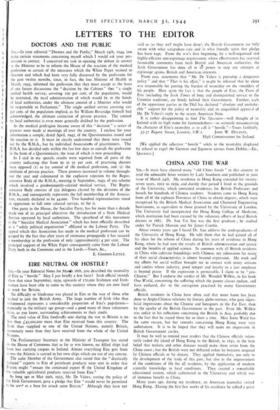DOCTORS AND THE PUBLIC
LETTERS TO THE EDITOR
SIR,—In your editorial "Doctors and the Public," March 24th, 1944, you make certain statements concerning myself which I would ask your per- mission to correct. I conceived my task in opening the debate, in answer to the Minister to be to inform the House of the reaction of the medical profession to certain of the measures which the White Paper seemed to threaten and which had been very fully discussed by the profession for the past twelve months, since, in fact, the late Minister of Health in March, 1943, informed the profession that they must accept as the basis of any future discussions the "decision by the Cabinet" that "a single unified health service, covering too per cent. of the population, would he instituted, the local administration of which would be in the hinds of local authorities, under the ultimate control of a Minister who would be responsible to Parliament." The single unified service covering too per cent, of the population implied, as Sir William Beveridge himself had acknowledged, the ultimate extinction of private practice. The control by local authorities is even more generally disliked by the profession.
As the medical profession became aware of this "decision " a series of protests were made at meetings all over the country. I enclose for your information a sample, dated April, 1943, of the Questionnaires issued and the reaction ,to it. It must be clearly understood that these were issued not by the B.M.A., but by individual Associations of practitioners. The B.M.A. has decided only within the last few days to consult the profession in the form of a Questionnaire, the issue of which is now proceeding
As I said in my speech, t esults were reported from all parts of the country indicating that from 90 to 95 per cent, of practising doctors were opposed (t) to lay control of tlfe medical profession, and (2) the abolition of private practice. These protests increased in volume through- out the year and culminated in the explosive rejection by the Repre- sentative Body of the B.M.A., meeting in September, 1943, of any scheme which involved a predominantly-salaried medical service. The Repie-
tentative Body consists of 232 delegates elected by the divisions of the B.M.A., and consequently represents the full membership of the Associa- tion, recently declared to be 44,000. Two hundred representatives voted in opposition to full time salaried service, to for it.
One party in the House, the Socialist Party, has for more than a decade made one of its principal objectives the introduction of a State Medical Service operated by local authorities. The spearhead of this movement is the "Socialist Medical Association" which has been officially described as a "solely political organisation" affiliated to the Labour Party. The appeal which" this Association has made to the medical profession can be gauged by the fact that after years of strenuous propagaricia it has secured a membership in the profession of only (approximately) 4 per cent. The principal support of the White Paper consequently came from the Labour Party both in the Commons and in the Lords.—Yours, &c., E. GRAHAM-LITTLE.






















 Previous page
Previous page